Single-use masks
Explore our range of single-use masks, including surgical, respiratory and hygiene masks, to suit all professional needs.
Available in strap or elasticated versions for optimum comfort, our masks are designed to provide effective protection in a variety of sectors, including medical, industrial and hygiene.
Whether you're looking for masks for surgical protection or industrial use, our selection is designed to meet the highest quality standards and offer maximum safety.
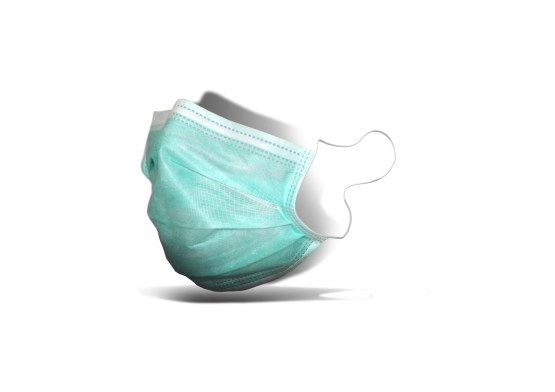
-

Respiratory protective mask FFP1 NR D Type IIR Kolmi Oxygen
-

Medical mask Type IIR Kolmi Vitals
-

Medical mask Type IIR Kolmi Softex
-

Medical mask Type IIR Kolmi Vitals
-

Medical mask Type II Kolmi Vitals
-

Medical mask Type II Kolmi Softex
-

Medical mask Type IIR Kolmi Softex
-

Medical mask Type IIR Kolmi Feeldry
-

Medical mask Type IIR Safe+Mask® SofSkin
-

Clean room & controlled environment mask ISO AIR
-

Clean room & controlled environment mask ISO AIR
-

Clean room & controlled environment mask ISO AIR
Types of disposable masks
We offer different types of disposable masks, which differ in terms of their usefulness, their specific features and the sectors they are intended for.
Medical masks
Medical masks are mainly used by medical staff when providing care or during surgery.
They offer dual protection:
1. They protect the environment from pathogens carried by droplets emitted by the wearer's mouth and nose.

2. They protect healthcare professionals from splashes of potentially contaminated biological fluids (Type IIR qualification).

They are widely used in hospitals and healthcare establishments.
There are 3 types of medical mask:
- Type I masks:
These are intended for use by medical staff to provide a barrier to external splashes and prevent the spread of infection. They are suitable for symptom-free patients.
- Type II masks:
These offer superior filtration to Type I masks. They are intended for use by healthcare professionals when in contact with symptomatic patients.
- Type IIR masks:
These offer similar filtration to Type II masks, but are also resistant to liquid splashes. They are generally used in surgical environments.
We have a complete range of single-use medical masks to meet all the needs of our different sectors of activity. Our masks are made from the highest quality raw materials sourced from the world's leading non-woven manufacturers. These raw materials, combined with Medicom's technological know-how, ensure that our masks offer excellent breathability and absolute comfort while maintaining a high level of protection.
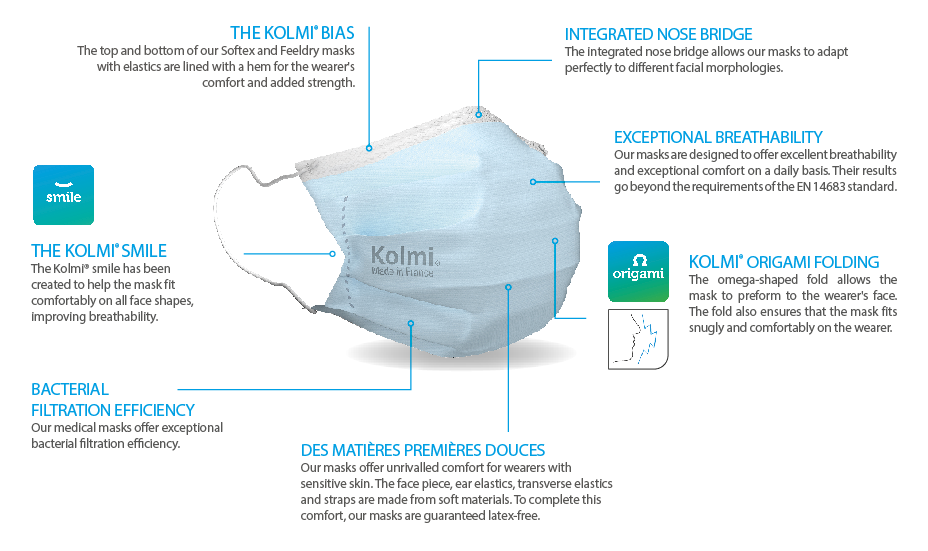
FFP respiratory masks
FFP (Filtering Face Piece) masks are respiratory protection devices. They are filtering masks that offer protection against fine particles and aerosols.
They are mainly used in the health, industry and construction sectors, where workers are exposed to high levels of airborne particles such as dust, fumes or pathogens.
There are 3 levels of filtration efficiency for airborne particles:
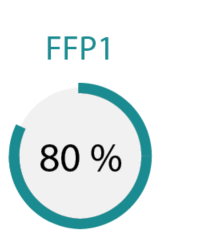
FFP1 masks
FFP1 masks offer minimal protection against airborne particles. They filter out at least 80% of airborne particles and are often used in environments where the concentration of particles is low, such as construction sites.
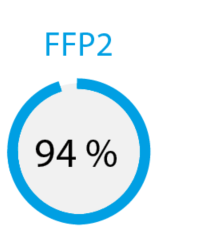
FFP2 masks
FFP2 masks offer greater protection than FFP1 masks. They filter out at least 94% of airborne particles and are generally used in environments where the concentration of particles is moderate, such as hospitals and laboratories.
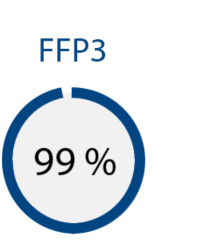
FFP3 masks
FFP3 masks offer the highest protection against airborne particles. They filter out at least 99% of particles and are used in environments requiring maximum protection, such as work environments exposed to infectious diseases.
Features of our FPP masks
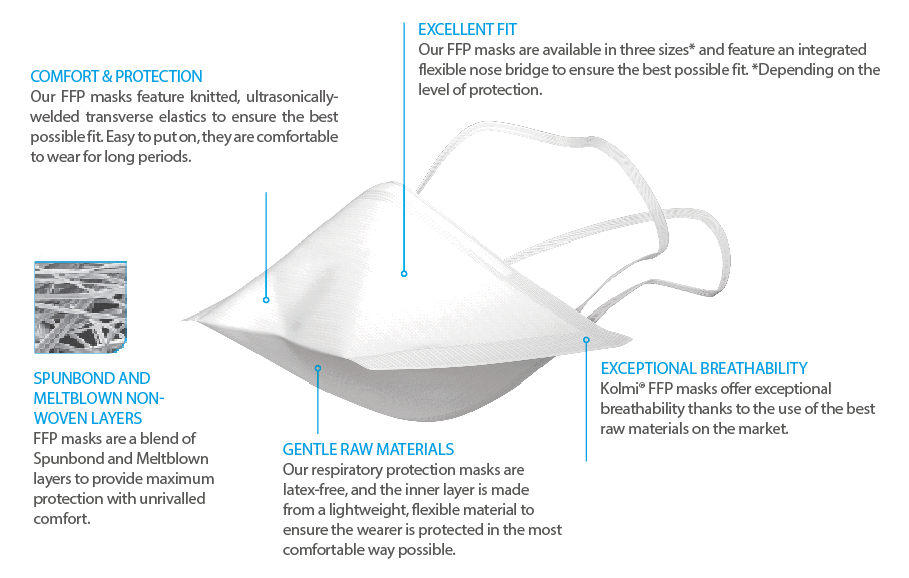
Masks for cleanrooms and controlled environments
In cleanrooms, masks are mainly used to protect the wearer's environment, but they can also provide protection for the user, as in the case of our FFP masks (category III PPE). Our sterile masks are designed for use in Grade A & B environments (from ISO 3 upwards) and our non-sterile masks can be used from Grade C ISO 3 upwards.
Thanks to Softex technology and its very low-release materials, the ISO AIR range has been specially designed to ensure user comfort and environmental protection. With results in excess of 99%, ISO AIR masks provide excellent bacterial, particulate and viral filtration, while offering breathable comfort for the wearer.
The entire ISO AIR range has been tested on the Helmke drum in accordance with recommendation IEST-RP-CC003.4 to ensure very low particle release.
Helmke drum test
The purpose of this test is to measure the number of particles emitted by a piece of cleanroom clothing (smock, overalls, bonnet, etc.) by simulating the movements of an operator in activity. The item of clothing to be tested is placed in a stainless steel drum that has been decontaminated beforehand and whose interior atmosphere is classified ISO 5. The drum is rotated at 10 rpm for 10 minutes, releasing the particles contained in the garment. A particle counter enables the precise and objective quantification of particles of sizes equal to or greater than 0.3 and 0.5 µm that have been released during the test.
ISO AIR masks can therefore be used in ISO 3 and + environments.
Classification
The cleanliness of cleanrooms and controlled environments is primarily classified by their particle concentration, i.e. the number of particles of a certain size found in a given volume of air.
There are currently two internationally recognised classification systems:
- ISO 14644-1
- Annex 1 of GMP (Good Manufacturing Practice), used in the pharmaceutical, cosmetics and biotechnology industries.
These two classification systems define the maximum acceptable concentration of particles per m3 of air. Different particle sizes can be taken into account (from 0.1µm to 5.0µm). One of the major differences between these two systems lies in the fact that GMP specifies not only the maximum concentration authorised when the cleanroom is in use (during the production phase) but also when it is at rest (when production is not in progress).
Our masks with straps and transverse elastics or FFP, used in operating theatres or controlled environment rooms, are manufactured in a controlled atmosphere zone (CAZ). Our CAZ ensures the continuous microbial cleanliness of our masks and guarantees our customers that they can be used immediately.
Specific features of our masks
Several types of fasteners
- Ear straps:
This type of fastener is attached behind the ears using elastic bands. This is the best-known fastening system. Easy to put on and take off.
- Straps:
These masks have straps that can be tied, allowing the user to adjust them around the nose and mouth according to preference. The length of the straps makes them easy to put on.
- Transverse elastics:
This system combines the ease of use of traditional elastics with the comfort of straps that are placed at the back of the head and neck, providing a better fit and more even pressure on the face.
Different options
Each strap can be used alone or in combination with others on each mask (except those in the clean room range).
|
 |
||||||
|
Anti-fog mask Prevents glasses from fogging up.
|
Anti-spray mask Thanks to a visor integrated into the mask, the face is protected against splashes of biological liquids. |
Anti-glare mask Reduces the risk of glare in high-light environments and mask reflection for spectacle wearers. |
||||

|
||||||
Quality and safety standards
The quality and safety standards with which disposable masks must comply are essential to guarantee their effectiveness and the protection of users.
European standard EN 14683:2019 + AC:2019
This standard defines the performance requirements for masks for medical use, taking into account various criteria that guarantee the quality of the mask and safety for the wearer's environment:
- Bacterial filtration efficiency (EFB)
- Breathability (Delta P)
- Resistance to splashes of biological fluids (Type IIR only)
- Biocompatibility
- Microbial cleanliness (Bioburden)
Additional tests (not required by EN 14683)
To guarantee its users additional protection, Medicom tests its masks against viruses and submicronic particles using two tests:
- Virus filtration efficiency (VFE)
- Filtration efficiency of 0.1 µm particles (EFP)
Certifications
The CE mark indicates that the mask meets European Union safety, health and environmental protection requirements. To obtain this certification, masks must pass tests that comply with current standards.
Regulations and directives
Regulation (EU) 2016/425 (European regulation) concerns personal protective equipment, including certain respiratory protection masks. It sets out the safety requirements they must meet before being marketed in the EU.
Advantages of single-use masks
C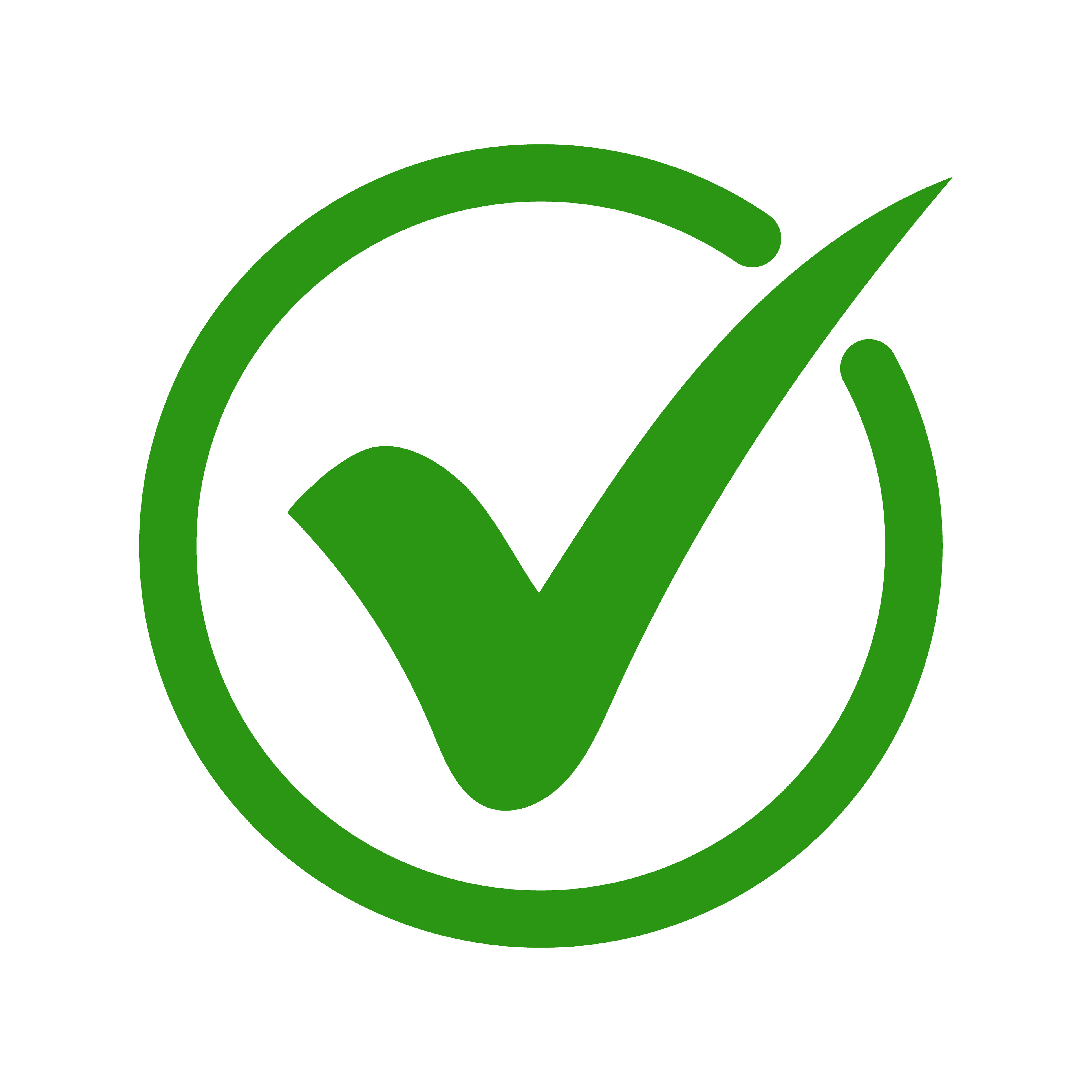 omodity
omodity
They are easy to use and carry. They are lightweight and can be put on quickly when needed. They require no maintenance or cleaning, making them practical for everyday use.
 Hygiene
Hygiene
Disposable masks are free from contaminants. They are designed to be used only once, reducing the risk of cross-contamination and the spread of bacteria and viruses. After use, they can be easily disposed of hygienically.
Ada ptability to different environments
ptability to different environments
Our single-use masks are suitable for a variety of environments, such as hospitals, clinics, laboratories, industries, dental surgeries, cleanrooms, etc. They can be used in a variety of situations where extra protection is needed.
Com pliance with safety standards
pliance with safety standards
They are manufactured in compliance with health and safety standards. They are tested for filtration efficiency and breathability, ensuring adequate protection against airborne particles, including bacteria and viruses.
Sa vings
vings
Disposable masks are less expensive than reusable masks, making them accessible to a wide range of people. What's more, disposable masks eliminate the need for regular washing and maintenance, which generates additional costs.
 Ease of breathing
Ease of breathing
Our disposable masks are made from lightweight, breathable materials such as polypropylene. This makes breathing easy and comfortable while providing adequate protection.
Guarantees and services
Fit test
Incorrectly fitted FFP respiratory protective equipment (PPE category III) can present a major and fatal risk. However, not all wearers of FFP masks are optimally protected.
Why is this?
- The wearer is not trained to wear the mask
- The mask does not fit properly on the wearer's face
- The size of the mask is not adapted to the wearer's morphotype
Medicom has established a partnership with Adjust'Air, a company specialising in fit testing of respiratory protection masks. This partnership enables Adjust'Air to carry out tests to check that FFP masks do not leak once they have been worn.
With its Kolmi Oxygen FFP masks, Medicom offers a choice of masks in sizes S, M and L to suit your body type.
Would you like to find out more about our offer, the test procedures or our ‘Fit Tester’ and ‘Coordinator’ packs?
Environmental impact
We strive to reduce our environmental impact by adopting sustainable practices in the design, production and marketing of our products.
